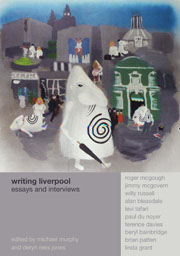Book contents
- Frontmatter
- Contents
- Acknowledgements
- List of Contributors
- Dedication
- Introduction: Sounding Liverpool
- 1 George Garrett, Merseyside Labour and the Influence of the United States
- 2 ‘No Struggle but the Home’: James Hanley's The Furys
- 3 Paradise Street Blues: Malcolm Lowry's Liverpool
- 4 ‘Unhomely Moments’: The Fictions of Beryl Bainbridge
- 5 A Man from Elsewhere: The Liminal Presence of Liverpool in the Fiction of J.G. Farrell
- 6 The Figure in the Carpet: An Interview with Terence Davies
- 7 ‘Every Time a Thing Is Possessed, It Vanishes’: The Poetry of Brian Patten
- 8 Finding a Rhyme for Alphabet Soup: An Interview with Roger McGough
- 9 Rewriting the Narrative: Liverpool Women Writers
- 10 Jumping Off: An Interview with Linda Grant
- 11 Ramsey Campbell's Haunted Liverpool
- 12 ‘We Are a City That Just Likes to Talk’: An Interview with Alan Bleasdale
- 13 ‘Culture Is Ordinary’: The Legacy of the Scottie Road and Liverpool 8 Writers
- 14 ‘I've Got a Theory about Scousers’: Jimmy McGovern and Lynda La Plante
- 15 Manners, Mores and Musicality: An Interview with Willy Russell
- 16 Subversive Dreamers: Liverpool Songwriting from the Beatles to the Zutons
- 17 Putting Down Roots: An Interview with Levi Tafari
- 18 ‘Out of Transformations’: Liverpool Poetry in the Twenty-first Century
13 - ‘Culture Is Ordinary’: The Legacy of the Scottie Road and Liverpool 8 Writers
- Frontmatter
- Contents
- Acknowledgements
- List of Contributors
- Dedication
- Introduction: Sounding Liverpool
- 1 George Garrett, Merseyside Labour and the Influence of the United States
- 2 ‘No Struggle but the Home’: James Hanley's The Furys
- 3 Paradise Street Blues: Malcolm Lowry's Liverpool
- 4 ‘Unhomely Moments’: The Fictions of Beryl Bainbridge
- 5 A Man from Elsewhere: The Liminal Presence of Liverpool in the Fiction of J.G. Farrell
- 6 The Figure in the Carpet: An Interview with Terence Davies
- 7 ‘Every Time a Thing Is Possessed, It Vanishes’: The Poetry of Brian Patten
- 8 Finding a Rhyme for Alphabet Soup: An Interview with Roger McGough
- 9 Rewriting the Narrative: Liverpool Women Writers
- 10 Jumping Off: An Interview with Linda Grant
- 11 Ramsey Campbell's Haunted Liverpool
- 12 ‘We Are a City That Just Likes to Talk’: An Interview with Alan Bleasdale
- 13 ‘Culture Is Ordinary’: The Legacy of the Scottie Road and Liverpool 8 Writers
- 14 ‘I've Got a Theory about Scousers’: Jimmy McGovern and Lynda La Plante
- 15 Manners, Mores and Musicality: An Interview with Willy Russell
- 16 Subversive Dreamers: Liverpool Songwriting from the Beatles to the Zutons
- 17 Putting Down Roots: An Interview with Levi Tafari
- 18 ‘Out of Transformations’: Liverpool Poetry in the Twenty-first Century
Summary
At a time when Liverpool's culture is being acknowledged and celebrated, we should ask whose culture and what sort of peoples have created the modern city of Liverpool. Arguably, it is the working-class ethos of the city that has contributed most significantly to the city's image and its growth. This is particularly noticeable in the wide attention given to a number of working-class voices that have emerged from the city in recent decades and gained national prominence. What has received less attention, however, are the writers' groups that have fostered some of these authors. It is the aim of this chapter to address this. Drawing on material from the archives of the Federation of Working-Class Writers and Community Publishers (FWWCP), and on correspondence and interviews with founding members, I will explore the precise reasons for the inception of one of these groups, Scotland Road Writers (Scottie Road), and its ability over two decades to bridge Liverpool's race/class divide.
In 1958 Raymond Williams published ‘Culture Is Ordinary’ in which he argues that the need to create, record and share experience is a common impulse. Williams restores the notion of cultural growth as being intrinsic to all groups, not just the middle class or those with a university education. He is helping us to recognize an important thesis that underpins this chapter: working-class people express their own forms of cultural and political growth in various creative and dynamic ways and their expression can to be driven by an all-too-often bitter life experience.
- Type
- Chapter
- Information
- Writing LiverpoolEssays and Interviews, pp. 194 - 209Publisher: Liverpool University PressPrint publication year: 2007
- 1
- Cited by



